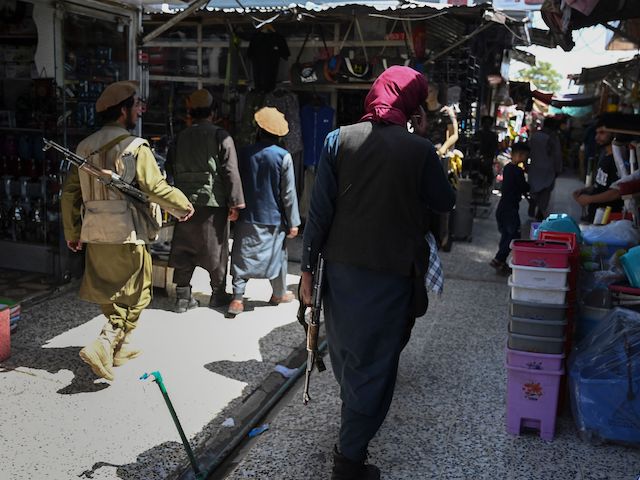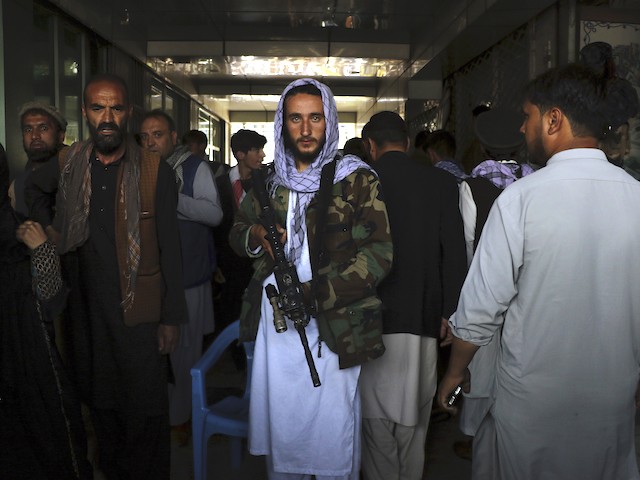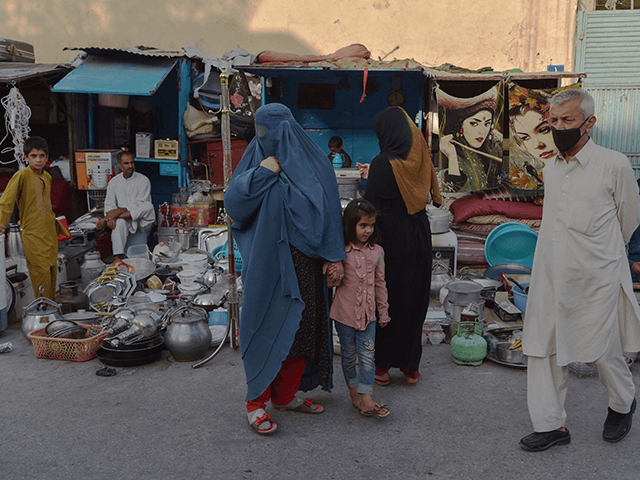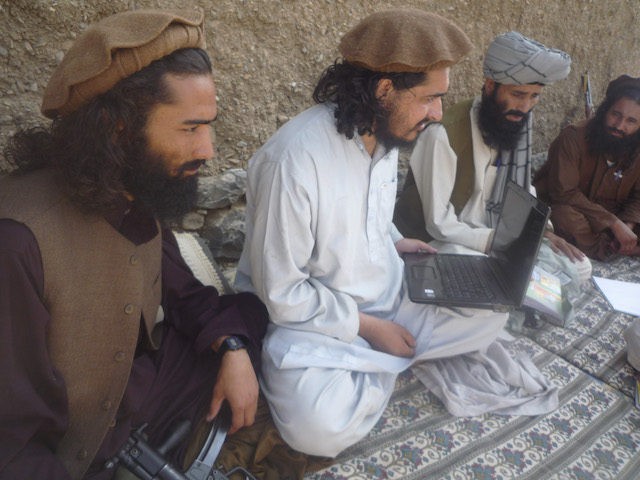The use of cryptocurrency surged in Afghanistan after the U.S. withdrawal began, and the impoverished country is now one of the top 20 cryptocurrency markets in the world, according to the 2021 Global Crypto Adoption Index.
This remarkable evolution could make it difficult to keep the Taliban regime out of the global marketplace or punish it for human rights violations with economic sanctions.
Chainalysis, publisher of the Global Crypto Adoption Index, noted that countries whose citizens “don’t have access to centralized exchanges” have been among the most enthusiastic adopters of cryptocurrency, a description that would certainly apply to many Afghans after the Taliban takeover.
The central banking system of Afghanistan is teetering on the verge of utter collapse under the Taliban. “No one has money,” an employee of the central bank glumly told CNN.

Taliban fighters arrive to shop at Bush market in Kabul on September 9, 2021. (Aamir Qureshi/AFP via Getty Images)
Foreign currency reserves are blocked, and institutions like the World Bank and International Monetary Fund (IMF) have suspended programs that could be looted by the new terrorist regime. On Wednesday, the International Committee of the Red Cross pleaded with the World Bank to unlock some Afghanistan funds to keep health care facilities running.
With little reason to trust their national banking system, hard currency reserves vanishing from even small regional exchange houses, and the national afghani currency rapidly losing value, Afghans rushed to embrace Bitcoin.
Some younger Afghans viewed crypto as a digital piggy bank where they could stash family wealth while the Taliban swept to power, with hopes of accessing the secured funds later once the political and economic situation stabilized.
“I have very, very, very limited resources to do anything. I’m interested in the crypto world, because I have earned a lot, and I see a lot of potential in myself that I can go further,” 22-year-old Farhan Hotak, resident of a remote village called Zabul, told CNBC in August.

Bank account holders gather outside a closed bank building in Kabul on August 28, 2021, following the Taliban’s stunning military takeover of Afghanistan. (Aamir Qureshi/AFP via Getty Images)
Another Afghan named Musa Ramin told CNBC he got burned in 2020 when he tried to convert some of his money to Turkish lira for safekeeping, so when the Taliban made its move, he decided to use bitcoin instead. Ramin said he lost money on bitcoin at first, but soon was “making more money in crypto in a month than in construction in a year.”
Analysts told the Wall Street Journal (WSJ) on Friday that for all the deprivations they suffer, many Afghans have been able to install cryptocurrency applications on their smartphones:
“Bitcoin will solve our problems,” said Safi Zarinagha, who runs a digital-currency business in Kabul. “It is really easy to exchange and to send money from one place to another.”
Terror sanctions against the Taliban are expected to continue to clog conventional financing, both from the private sector and from sources of international assistance, say current and former Western officials.
But the ability of crypto platforms to make large-value transactions without banks could help unclog those critical cross-border money flows, say bitcoin advocates and local traders.
“It hasn’t caught on that much by the hawaladars, but there are some young, tech-savvy guys who are using bitcoins as a form of hawala,” said another Afghan trader. “It’s censorship-resistant and highly efficient,” the trader said.
Hawaladars are informal local bankers who rely on family connections and personal trust to keep their transactions secure. Some regulatory systems regard hawala as little better than loan-sharking and money-laundering rackets, warning that trust-based banking systems are highly vulnerable to abuse. Friendlier financial analysts see them as a means of working around dysfunctional central banking systems to keep vital goods and services flowing.

Taliban fighters stand guard by a black market currency exchange at Sarai Shahzada market in Kabul, Afghanistan, September 4, 2021. (AP Photo/Wali Sabawoon)
As the WSJ’s analysts suggested, Bitcoin and other cryptocurrencies fit quite well into the hawala model, and in Afghanistan, bitcoin seems to be replacing the traditional underground banking system. Crypto could be particularly useful for helping family members and concerned foreigners overseas provide remittances to Afghans trapped under Taliban rule.
Unfortunately, the Taliban also appears to be eyeing crypto as a useful tool for bypassing Western sanctions:
Some supporters of the Taliban, such as an Afghan-American woman who said she uses the pseudonym “Bibi Janey” on Twitter, say the ability to send anonymous bitcoin transactions and avoid the Western financial system makes it a perfect financial tool for Kabul’s new rulers.
“I’d like to suggest to the Taliban senior leadership to hold an emergency meeting with money exchangers (sarafis) to train them on exchanging bitcoin,” she wrote on Twitter four days after the group seized power in Kabul.
The Taliban regime has made no official statements about cryptocurrency to date, but various terrorist organizations and outlaw regimes like Iran are using crypto to bypass sanctions, so there is every reason to believe the Taliban will consider doing the same.

A burqa-clad Afghan woman looks for items to buy at a shop displaying used household items for sale at a market area in Kabul on August 25, 2021. (Wakil Kohsar/AFP via Getty Images)
On the other hand, Ethereum cofounder Charles Hoskinson told CNBC that cryptocurrency could become an instrument for “resistance” against the Taliban regime.
“It is my belief that cryptocurrencies are going to play a larger role in Afghanistan this time around, in the war for and against the Taliban forces. There is going to continue to be civil war and conflict and they are going to need resources,” Hoskinson said.

COMMENTS
Please let us know if you're having issues with commenting.